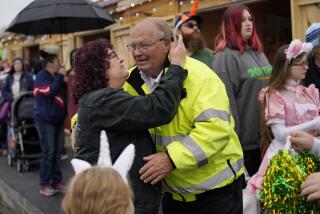A Cruel Halloween Some Can’t Forget
- Share via
MARIETTA, Ga. — Today, this Atlanta suburb will hold a noontime Halloween celebration. Kids will come in costume. Their parents will smile proudly. Few will recall the tragedy 40 years ago that changed the meaning of Halloween here.
Roy Pritchard Jr., 60, remembers it because he was there and helped dig for survivors. For years afterward, he didn’t like going to the town square at night.
Bill Dunaway, 64, was away in Boston and heard the news on a radio station, which broke in on its programming to announce that a Georgia store filled with revelers had blown up, killing seven and injuring dozens.
The Halloween night party downtown “was a tremendous tradition,” said Dunaway, the town’s current mayor. “The gas explosion ended it. It never resumed.”
Marietta liked to make an event of Halloween. It blocked off the square downtown, where cotton farmers once hauled their crops in for sale. Children wandered around in costume while their parents shopped at the dry goods stores that ringed the square before malls came along and forced them out of business. Today, those shops are antique stores, but back then one of the most popular businesses was the Atherton drugstore. It had a soda fountain in back, and it still delivered drugs to its clients.
On Halloween night, the store was filled, said Pritchard, 20 at the time and a rookie firefighter. One of the customers was a businessman who made it a practice of stopping by Atherton’s after work every night to pick up a cigar. A man and his son were waiting to buy a mask. In this town, where everybody knew everybody, it was business as usual -- brisk and chatty.
“I had worked in that store,” Pritchard said. “One of the ladies who was killed used to cut up and carry on with me.”
The explosion occurred when a gas main under the street ruptured and leaked gas into Atherton’s basement, which was filled with compressors and other equipment. Something provided a spark, and the store blew apart. Many of the estimated 35 injured were cut by flying glass.
The explosion took the paint off cars outside and blew the clothes off of one woman, but didn’t otherwise harm her, said Charles M. Brown, 77.
Seven people, all near the cashier, were killed. Pritchard felt the ground shake from his house a mile away. He was one of the first rescuers on the scene. “There was stuff blown all over the street,” he said. “People were lying all over the place.”
Some of the wounds were horrific. For Pritchard, what made it worse was that he knew most of the people he was trying to help. The work went on for hours. The last missing body was that of 7-year-old Terry Carter, who had been waiting to buy a Halloween mask. As Pritchard and the others dug in a pool of water in the blast pit, he prayed he wouldn’t be the one to find the child.
“Of course, we did find him,” he said. “It tore us all up.”
Pritchard said the tragedy affected him for years. He couldn’t understand how life could be so fickle and careless. Even today, he thinks about the man who went into Atherton’s every day to buy his cigar. “One day, he didn’t come back out.”
Marietta, 20 miles from Atlanta, has changed a lot in 40 years. Like a lot of country towns on the edges of metropolitan areas, it has become a bedroom community. With 60,000 people now, it has roughly tripled in size since 1963. Most of the newcomers have no knowledge of those long-ago events.
So it is left to people like Brown to remember the tragedy that changed Halloween. They are not sentimental about it. They try to keep things in perspective. Asked if the explosion was the worst tragedy to befall Marietta, Brown was firm.
“No,” he said. “Sherman was.”
More to Read
Sign up for Essential California
The most important California stories and recommendations in your inbox every morning.
You may occasionally receive promotional content from the Los Angeles Times.













